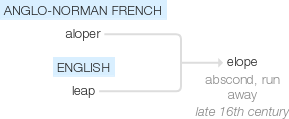Elope
late 16th century (in the general sense ‘abscond, run away’): from Anglo-Norman French aloper, perhaps related to leap.
wiktionary
From Anglo-Norman aloper(“to abduct, run away”), from a Germanic source, either Middle Dutch ontlopen(“to run away”) or a predecessor thereof. Equivalent to and- + lope as well as and- + leap (these being doublets). Cognate with German entlaufen(“to escape”), Danish undløbe(“to run away”). More at lope.
etymonline
elope (v.)
1590s, "to run off," probably from Middle Dutch (ont)lopen "run away," from ont- "away from" (from Proto-Germanic *und- which also gave the first element in until, from PIE root *ant- "front, forehead," with derivatives meaning "in front of, before") + lopen "to run," from Proto-Germanic *hlaupan (source also of Old English hleapan; see leap (v.)). Sense of "run away in defiance of parental authority to marry secretly" is 19c.
In support of this OED compares Old English uðleapan, "the technical word for the 'escaping' of a thief." However there is an Anglo-French aloper "run away from a husband with one's lover" (mid-14c.) which complicates this etymology; perhaps it is a modification of the Middle Dutch word, with Old French es-, or it is a compound of that and Middle English lepen "run, leap" (see leap (v.)).
The oldest Germanic word for "wedding" is represented by Old English brydlop (source also of Old High German bruthlauft, Old Norse bruðhlaup), literally "bride run," the conducting of the woman to her new home. Related: Eloped; eloping.
